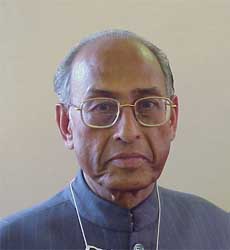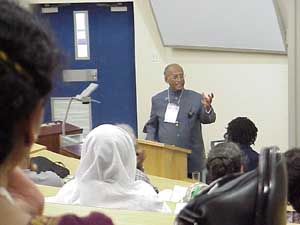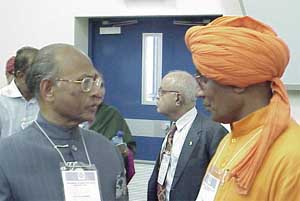|
|
Wylie and Helene Parliament of the World's Religions |
|
The Future of Religions
By Dr. L. M. Singhvi
Dr. Singhvi’s major premise was that we are living in an increasingly secular world and that religions will have to evolve to stay compatible with the people they hope to serve.
People want to think about God. They want a spiritual component to their lives. At the same time they have become more worldly. They know the world is not flat and that people who follow other faiths are not 3 headed monsters.
Pluralism
In addition, many people are beginning to understand that their spiritual tradition may not be the only access to divinity. And that even if there is only one god, perhaps s/he has many names or incarnations.
A religion that professes to be the "only" way with absolute dogma will surely fail. A sophisticated populace cannot be kept in a box. Pluralism is also increasing. Many major metropolitan cities are now the home to numerous faiths and houses of worship. This exposure for the general populace is leading more and more people to explore and understand what other religions are all about. This has lead to a mixing of faiths.
Inclusiveness
For example, a traditional Christian takes a yoga class and is introduced to mindfulness of the breath, a major Buddhist focus. This could lead to an exploration and appreciation of other Buddhist concepts.
If their Christian community has "zero tolerance", this person could end up feeling unwelcome. In the end they could lose the affinity for their tradition house of worship. On the other hand, if their religious community has some flexibility, it could well be that this person would remain a Christian with Buddhist sympathies. Dr. Singhvi concludes that religions which do not evolve and show some flexibility will lose their following. Religions need to be more inclusive than exclusive.
|


